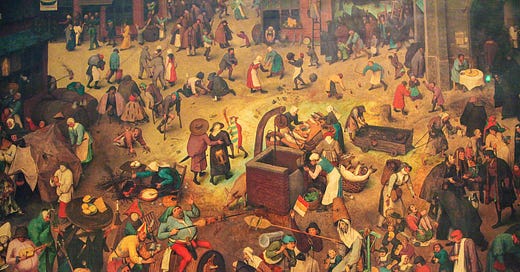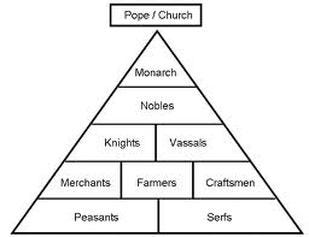Insight - Feudalism Incoming As The State Reinvents Itself As King
Part 6 of Rival For Power: The meta monarch shall reign in a virtual realm
AI as replacement for the divine right of kings; to grant or cancel social standing.
Monarchs co-opted by World Economic Forum to push The Great Reset.
Glitzy royal publicists or conspirators in a celebration of historical revival.
Transhumanism posits the Earth as techo-creation, humans as hackable animals.
Progress is recast as Back To The Future, led by stakeholders in feudal retro-gression.
Would you be queen for a day; in which case how would you shape your kingdom?
Rivals for Power is a series on the forces behind Event Covid.
Part 1, “Guildsmen Trap us in the Middle Ages” (Jul 5, 2021)
Part 2, “Bankers Infect the Economy -Covid Cure was Premeditated” (Jul 13, 2021)
Part 3, “Vengeance, Feuds and Memory - The vectors of social control” (Jul 28, 2021)
Part 4, Spies, Dupes and Charities - Norman Dodd and the tax-exempt foundations (Aug 7, 2021)
Part 5, “War and Wealth - Prelude” (Aug 10, 2021)
Part 6, “Feudalism Incoming As The State Reinvents Itself As King - The meta monarch shall reign in a virtual realm” (Jan 7, 2023)
(2,400 words or 11 minutes of your time.)
Jan 7, 2023
Imagine some AI version of a king, a giant information-sucking computer enthroned in a data centre, related by bloodline to to a network of regents around the world. Lights flicker to the beeping of alerts. The ruler clicks and whirrs.
Cameras scan, faces cross-referenced to social media activity; Kevlar-kitted police with robot attack dogs spring into action: order is restored.
At the beginning of the new millenium, the monarchical-feudal system made a comeback. Aeons ago it had been consigned to the costume gallery of history. In the popular consciousness it provided the setting for period dramas on Netflix or HBO but no-one took it seriously as way to run a 21st century society.
Yet that is what happened. The world’s remaining monarchs found themselves thrust into the spotlight as unlikely experts of the global elite — the World Economic Forum (WEF) promoting a reset of society. Kings and bankers are on the same side; in some cases they have intermarried.
King Charles, then Prince of Wales, launched The Great Reset in June 2020 on behalf of the WEF. Queen Maxima of the Netherlands has been the primary royal voice on “resetting digital currencies.” These are only the most prominent in a procession of monarchs helping promote the Davos projects.
Perhaps they add glitz — just another public engagement to give the gnome, Herr Klaus, greater pulling power — but bear in mind that these private foundations and the intergovernmental institutions, the United Nations, UNESCO, the World Bank and the World Health Organisation, are working together (by formal agreement or MOU) to forge a reconstructed society.
The BBC’s political editor said in summer of 2021, “we should spend less time on the distracting national puppet show and more time thinking about what I might delicately call the deeper sources of authority.”
Who better to communicate the feudal mindset — horses for courses — than the royal banality? The years counting down to Event Covid were marked by one of the most egregious examples of cultural programming, Downton Abbey, in which the English-speaking world was reacquainted with its fawning, pedestrian roots at the foot of aristocracy.
The majority of the population would fall in line with subservience and not even notice as they would later don masks and march six feet apart on command.
Data is a manacle not a jewel
You may read elsewhere about the Reset and the eponymous Fourth Industrial Revolution fusing man and machine; integrating body with nanotechnology. Partly futurist dreaming, accompanied by Yuval Harari’s pastiche of Things To Come, a written-to-order, postmodern prayer book. Yet the core projects are real: the shackling of the human to data: genetic makeup, health status and passport or freedom of movement — made a conditional privilege.
The point to grasp is that the economic system long ago ceased to be capitalist. Wealth is far more concentrated today than it was in the heyday of trade and industrialisation, which relied heavily on the diffuse functions of a middle class. The concentration of wealth has reached pre-capitalistic levels, hence the comparisons with feudalism.
This is no lazy reach for narrative cliché. One can make a case that the State has taken the place of Tsar in the pyramidal hierarchy.
This may be the inevitable consequence of constitutional monarchies. When societies dispensed with the divine right of kings they removed the monarch as intermediary, giving way to man’s birthright directly under God — and whether you are religious or not, it meant that no man had right of absolute power over another.
But those inalienable rights could only hold so long as citizens constrained the bureaucracy and the state in check. The authors of the U.S. Constitution were fully aware of this.
“When once a republic is corrupted, there is no possibility of remedying any of the growing evils but by removing the corruption and restoring its lost principles; every other correction is either useless or a new evil.” — Montesquieu in Spirit of the Laws, quoted by Thomas Jefferson.
For almost 300 years they succeeded, but then came the corporation. By hijacking the 14th Amendment to the U.S. Consititution, which was intended to guarantee “equal protection of the laws” after the Emancipation, lawyers managed to turn corporations into legal persons.
Corporations are driven — and legally obliged — to do whatever is necessary to increase profits for their shareholders, yet they are incapable of empathy, guilt or remorse. Psychologists recognize this behaviour in an individual as psychopathic.
In 2011 U.S. Sen Bernie Sanders called for a constitutional amendment to repeal the notion of corporate personhood.
What has happened is sometimes called corporate capture. It begins with lobbying, in which sectors like the military industrial complex influence policy through congressional donations. Billionaire “philanthropic” foundations took this futher by effectivily commandeering government policy.
If you think this is an exaggeration consider that the budget of the UK’s equivalent of the U.S. State Department, the Foreign, Commonwealth and Development Office is about £1.2 billion for basic running costs, most of which are sunk into staff, buildings, IT and travel (though in bureaucracy it is always opaque where the administrative cost limit gives way to productivity and value added). [1]
Although this out-ranks the budget of most think tanks, the influence shops of the banks and corporations have much lower overheads and thus greater resource can be directed into policy making — which is exactly what they do. The MINDSPACE document (2010) that determines the British and Australian governments’ Covid response was developed by the Institute for Government which is funded by the Sainsbury grocery family, closely linked to the Wellcome, Gatsby and Darwin Trusts.
The jam is at the end of the spoon. The UK Foreign Office controls a budget for official development assitance (ODA) of about £10 billion. Thus by influencing government policy at relatively low cost, corporate foundations can direct huge sums of taxpayer money — which is precisely the mechanism that we saw with the Covid response.
Once corporations allied themselves with the state in public-private partnership, the die was cast. Bill Gates is on record, boasting that his “philanthropic” investments in vaccines yield a 20:1 return. (Search for his CNBC interview.)
Ball and chain
Contrary to the dominant narrative in the press it is not technology that has driven this change but financialisation. This has seen the unprecedented concentration of wealth in the hands of a fraction of one per cent.
It did not happen by accident but required a series of parallel developments including control of the banking system, the metastatic growth of corporations, the power provided by cross-holdings in the hands of a small group of investors, the use of corporate money through “charities” and foundations to take control of public life in order to serve the interests of said corporations and their owners, greased by the financialization and corruption of society.
Technology is a small part of the story. Empires with much more primitive technology have declined in the same way. See the Roman Empire, for example.
Technology is approaching the point where computers could replace most desk work, and robots do most physical tasks at lower cost than humans. That does not explain how a small self-interested group has found a way to privatise the profits and socialize the losses, enabling a historic concentration of wealth — though technology shall likely play a key role in maintaining and perpetuating this social order.
For technology to be used as control, governments, corporations and bankers had to break the laws that safeguard individual data. Banks and politicians have for decades made a song and dance about data protection laws — yet they sanction abuses that violate these exact same laws. This is inescapable: the insecurity of personal information is central to the new world order.
They overturned the historic right to privacy — summed up in the phrase a man’s home is his castle — along with the parental right to make decisions for their children.
Data is not so much the new gold. If you look at the proposals for central bank digital currencies that would give banks the power to track your spending, and to shut it off, data is the new cast iron shackle, manacle or ball and chain.
It opens the door to predictive policing and a new form of military warfare which takes as its primary target the domestic population.
Britain’s Integrated Operating Concept “challenges norms of civil-military relations and the dynamics of Westminster agencies: The old distinction between foreign and domestic defence is increasingly irrelevant.” [2]
Nor is the idea new. It bears some similarities to the report, From PSYOP to MindWar: The Psychology of Victory, by Col Michael A. Aquino, a psychological intelligence officer with the U.S. Army and a founder of the Temple of Set.
“The advantage of Mind War is that it conducts wars in nonlethal, noninjurious, and nondestructive ways. Essentially you overwhelm your enemy with argument. You seize control of all of the means by which his government and populace process information to make up their minds, and you adjust it so that those minds are made up as you desire.
Everyone is happy, no one gets hurt or killed, and nothing is destroyed. Ordinary warfare, on the other hand, is characterized by its lack of reason. The antagonists just maim or kill each other's people, and steal or destroy each other's land, until one side is hurt so badly that it gives up or both sides are hurt so badly that they agree to stop short of victory]. After such a war there is lasting misery, hate, and suffering.” [3]
When we wrote about this future one year ago, it seemed improbable to many; perhaps impossible. Few were willing to republish the articles. They earned clicks but few likes. Is it speculative now?
In the intervening year the declarations by privately-owned central banks that they are ready to launch some form of distributed ledger technology has fortified the dissenters.
They’ll own everything
Contrary to the popular view, the feudal monarchs did not own everything. In practice the crown held only a portion of the lands and distributed the majority to nobles, who in turn granted fiefs to their knights and vassals in return for maintaining social order and providing military force. In essence it was the nascent State that owned everything.
What floats above the pyramid’s capstone, bestowing authority on the monarch?
Keep reading with a 7-day free trial
Subscribe to Moneycircus to keep reading this post and get 7 days of free access to the full post archives.





